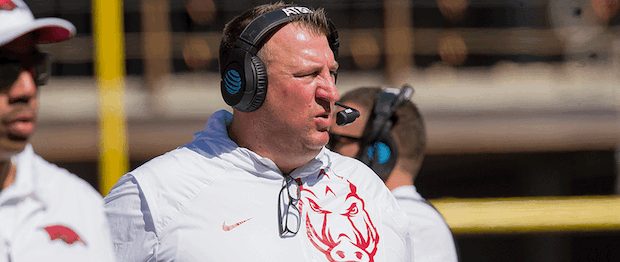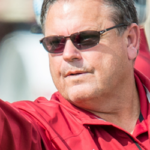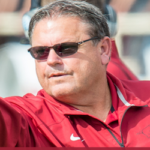 We’re in Danny Ford (circa 1997) territory with Arkansas head football coach Bret Bielema these days. The coach often doesn’t seem to want to be there, doesn’t appear half the time to know what his team is doing on the field, and when you’re certain there is no way Arkansas can look any worse than it just did the previous Saturday, the Razorbacks go and drop a worse egg.
We’re in Danny Ford (circa 1997) territory with Arkansas head football coach Bret Bielema these days. The coach often doesn’t seem to want to be there, doesn’t appear half the time to know what his team is doing on the field, and when you’re certain there is no way Arkansas can look any worse than it just did the previous Saturday, the Razorbacks go and drop a worse egg.
It was over for Danny Ford in Little Rock in late October 1997 when a mediocre South Carolina team trampled his uninspired Hogs 38-19. Folks were certain going into that game that, despite such horrendous losses as the 31-6 opening defeat in Shreveport to always pathetic SMU and a 56-7 loss in Gainesville to the Florida Gators, the Razorbacks would certainly be turning it around against a beatable South Carolina.
But, they didn’t, and sportswriting sage Orville Henry was already throwing out hints of change while noting the great turnaround job Tommy Tuberville was doing at Ole Miss, and the fans who doted on Orville’s every word every week knew what he was saying: Frank Broyles had his next man.
And, of course, that next man would instead be Houston Nutt and everyone knows that story, so no sense rehashing it, nor going through all the ups and downs to how we’ve gotten here with Bret Bielema in his Year 5 looking a whole lot Ford’s Year 5. We’re just here.
By the time Ford’s talented sophomores in the program and his beaten down juniors in the offensive line all had come around, and coordinator Kay Stephenson’s complete change of offense had finally begun to take hold, it was too late for Ford. Nobody even noticed how well the Hogs played Tennessee and Peyton Manning in Little Rock, or that they beat a really stout and SEC West-contending Mississippi State in Fayetteville, and then gave enormously talented LSU all they could handle in the finale. It was still a 1-2 finish and a 4-7 overall record, the second in a row for Ford, the third in five years for the onetime national championship winning coach at Clemson, who was booted there for clashing with the school president in early 1990 and talked out of retirement to his cattle farm by Broyles, first to consult interim coach Joe Kines in 1992 and then take over the reins in 1993.
Ford’s problem was not unlike Bielema’s: not really knowing the lay of the land for recruiting to Fayetteville when he arrived. Mainly, he expected more from the instate crop, but he eventually did appreciate Texas and north Louisiana talent. And as much as he’s criticized by Hog fans, Jack Crowe had actually done a decent job recruiting in some key spots, enough to deliver the pieces that Ford put together for a miracle SEC West championship in 1995 (Ford did beat Alabama at its return to prominence under Gene Stallings, and beat Auburn as well). And, it was that triumphant season that brought in some of the best talent the Hogs had assembled since the 1970s, only they had to grow up and take their lumps while Ford was going 4-7 each of the next two seasons while the fans and Broyles lost patience. The worst thing to happen for Ford was only 37,000 fans showing up for that next to last game in 1997.
Arkansas fans in 1997 wanted to blame coaching first, as they are wont to do everywhere and always, and naturally Kay Stephenson was lambasted for an offense that allowed 42 sacks to sophomore quarterback Clint Stoerner. Miles Aldridge had been hired that season as defensive coordinator, too, and there were plenty of ups and downs on that side for future stars like Kenoy Kennedy, David Barrett, Ryan Hale and Jeromy Flowers.
Does this all sound familiar?
Bielema stubbornly refused to listen to anyone when he arrived about the needs of Razorback football. He’d do it the same way he won at Wisconsin, by taking the few D-1 instate players and combing the Midwest and Florida for what he could get to fill out his classes.
His first staff had little ties to Texas, and his first defensive coordinator, Chris Ash, was woeful in his efforts there, especially recruiting safeties and linebackers. But Bielema’s main tie to Florida, defensive line coach Charlie Partridge, so vital in bringing aboard running back Alex Collins and O-lineman Denver Kirkland, was gone after Year 1 to take the head coaching job at Florida Atlantic.
Sam Pittman, Bielema’s O-line coach from years 1-3, helped him cobble together a massive bunch of road graders for the Wisconsin-style power running game he planned to install. It’s obvious they didn’t find enough to sustain it.
So, we are here. Years 1-2-3 of Bielema failed to deliver the areas that are painfully undermanned with junior and senior talent: Safeties. Linebackers. Offensive linemen. Defensive lineman.
However, Arkansas may have more walk-ons in its two-deep roster than ever, and may lead all of the Power-5 teams in walk-ons having significant roles on offense or defense or on special teams. A Parade All-American kicker sits behind a walk-on. Four-star offensive linemen are benched behind walk-ons. A walk-on has led the way lately in the secondary, and a true freshman walk-on has made key plays at linebacker.
And, understand, this isn’t an indictment of these players or walk-ons in general. Bielema wanted a strong walk-on program. It’s a good thing he did, because a good many of his scholarship players are underperforming or were poorly evaluated. The promise of taking a handful of unheralded prospects and turning them into J.J. Watt through the strength and conditioning program and “coaching them up” is not working here.
Bielema’s best recruiting class was his first, especially convincing Hunter Henry to stay home and getting Alex Collins to come from Miami. The next two were obviously well below SEC quality. His last two signing classes appeared on paper to be an improvement, but only a handful of those youngsters have shown immediate promise.
The biggest question now, as Arkansas heads into the home stretch with its head coach in limbo, is whether the young pups who came with such high accolades will start biting: players like sophomore defensive end McTelvin Agim (1 tackle last week vs. Auburn, 10 solo stops for the year) or sophomore running back Devwah Whaley (42.1 yards per game, 4.3 yards per carry). Redshirt freshman quarterback Cole Kelley, in place of the injured starter Austin Allen, has been thrown to the wolves in facing Alabama and Auburn defenses; maybe we’ll see more of his potential against an Ole Miss defense that is a hot mess of 2-3 potential stars and many more holes.
The youngsters who already jump out with star potential for Arkansas are sophomore linebacker De’Jon Harris, cornerback Kamren Curl, redshirt freshman receiver Jordan Jones and true freshman kick returner De’Vion Warren (for his speed if nothing else). That’s not a long list, considering the opportunities abounding to step up for the struggling 2-5 team.
Arkansas has four games among its next five where it should match up far better in talent than it did against Alabama and Auburn, which everyone figured before the season were likely losses. The TCU and Texas A&M games were expected to be close and played out that way, although TCU eventually pulled away in the last two minutes for a 28-7 win. The 48-22 loss at South Carolina, where the Gamecocks scored three TDs with their defense, is the anomaly among expected outcomes. Yet, here we are.
The expected result Saturday, considered Ole Miss lost the heart of its team in quarterback Shea Patterson last week to a knee injury and has no defense to speak of, is that Arkansas should roll even playing on the road. A 4-1 finish by Bielema’s Hogs might throw some water on the fire under his rear, and it would get Arkansas to a trivial bowl game for more experience. As more younger players surface the next month, it could give Hog fans hope for next year and 2019.
Lay an egg the way Danny Ford’s last team did about this time 20 years ago, however, and there’s no saving this sinking ship.













